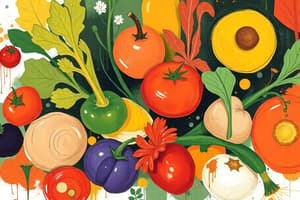Podcast
Questions and Answers
Which of the following best describes the characteristic of a food trend in its embryonic stage?
Which of the following best describes the characteristic of a food trend in its embryonic stage?
- Becoming commercialized and appealing to latecomers
- Rare, exclusive, and catering to an elite audience (correct)
- Widely available and adopted by mainstream businesses
- Embraced by intrepid consumers and posted on social media
According to the trend life cycle, a food trend's relevance can be maintained by pushing it to the level of ridicule.
According to the trend life cycle, a food trend's relevance can be maintained by pushing it to the level of ridicule.
True (A)
List three ways to identify a potential food trend before it becomes mainstream.
List three ways to identify a potential food trend before it becomes mainstream.
- Monitoring social media and chef discussion groups. 2. Observing growing concepts and designs, including target demographics. 3. Analyzing the supply chain.
According to the principles of Nouvelle Cuisine, one 'shalt not be systematically ______'.
According to the principles of Nouvelle Cuisine, one 'shalt not be systematically ______'.
Match the following stages of a trend life cycle with their description:
Match the following stages of a trend life cycle with their description:
What was the primary motivation behind the emergence of Nouvelle Cuisine?
What was the primary motivation behind the emergence of Nouvelle Cuisine?
Which of the following chefs is NOT associated with Nouvelle Cuisine?
Which of the following chefs is NOT associated with Nouvelle Cuisine?
Thou shalt use fresh, quality products. Which category of Nouvelle Cuisine does this commandment fall under?
Thou shalt use fresh, quality products. Which category of Nouvelle Cuisine does this commandment fall under?
Which of the following statements accurately reflects the data provided regarding vegetarianism and veganism across different countries?
Which of the following statements accurately reflects the data provided regarding vegetarianism and veganism across different countries?
The content suggests a universal consensus among researchers and nutritionists about the long-term health benefits of veganism over omnivorous or vegetarian diets.
The content suggests a universal consensus among researchers and nutritionists about the long-term health benefits of veganism over omnivorous or vegetarian diets.
What environmental benefits can be derived from sustainable forms of livestock?
What environmental benefits can be derived from sustainable forms of livestock?
According to the food guide, one serving of cheese is equal to ______ g.
According to the food guide, one serving of cheese is equal to ______ g.
Match the food item with its appropriate serving size according to the provided food guide:
Match the food item with its appropriate serving size according to the provided food guide:
What potential health benefits are associated with reducing the consumption of meat and dairy, as mentioned in the content?
What potential health benefits are associated with reducing the consumption of meat and dairy, as mentioned in the content?
According to the food guide, which of the following constitutes one serving of vegetables or fruit?
According to the food guide, which of the following constitutes one serving of vegetables or fruit?
Which of the following best describes the lasting impact of nouvelle cuisine on mainstream cooking?
Which of the following best describes the lasting impact of nouvelle cuisine on mainstream cooking?
The content explicitly endorses calls for a complete global shift to plant-based diets, dismissing the role of grazing animals in sustainable ecosystems.
The content explicitly endorses calls for a complete global shift to plant-based diets, dismissing the role of grazing animals in sustainable ecosystems.
The food trends categorized as 'natural' primarily focus on ingredients derived from plant sources.
The food trends categorized as 'natural' primarily focus on ingredients derived from plant sources.
What is one key dietary change that was promoted during the low-fat diet trend of the 1940s, and what unintended consequence arose from this trend?
What is one key dietary change that was promoted during the low-fat diet trend of the 1940s, and what unintended consequence arose from this trend?
According to the commandments of healthy eating, one ______ not ignore dietetics.
According to the commandments of healthy eating, one ______ not ignore dietetics.
Match each food trend category with its primary focus:
Match each food trend category with its primary focus:
Considering the evolution of dietary guidelines, what critical flaw was identified in the classic food pyramid?
Considering the evolution of dietary guidelines, what critical flaw was identified in the classic food pyramid?
How do 'medical' health trends differ from 'natural' health trends in the context of modern food choices?
How do 'medical' health trends differ from 'natural' health trends in the context of modern food choices?
Which of the following options accurately reflects the correlation between dietary trends of the 1940s and subsequent health outcomes?
Which of the following options accurately reflects the correlation between dietary trends of the 1940s and subsequent health outcomes?
Which of the following best describes the primary goal of the Terra Madre Foundation?
Which of the following best describes the primary goal of the Terra Madre Foundation?
The University of Gastronomic Sciences (UNISG) was founded with the primary objective of training future chefs in modernist cuisine techniques.
The University of Gastronomic Sciences (UNISG) was founded with the primary objective of training future chefs in modernist cuisine techniques.
What is a primary challenge associated with the farm-to-table movement, relating to cost and sourcing?
What is a primary challenge associated with the farm-to-table movement, relating to cost and sourcing?
A significant disadvantage of the farm-to-table approach is that menu changes occur ______ to accommodate seasonal availability.
A significant disadvantage of the farm-to-table approach is that menu changes occur ______ to accommodate seasonal availability.
Match the concept with its description:
Match the concept with its description:
What is a key economic benefit of the farm-to-table movement?
What is a key economic benefit of the farm-to-table movement?
Molecular gastronomy primarily focuses on reducing greenhouse gas emissions from food transportation.
Molecular gastronomy primarily focuses on reducing greenhouse gas emissions from food transportation.
Define what is meant by 'molecular gastronomy'.
Define what is meant by 'molecular gastronomy'.
What was the primary reason leading the founding chefs of the molecular movement to transition towards "Modernist Cuisine"?
What was the primary reason leading the founding chefs of the molecular movement to transition towards "Modernist Cuisine"?
The Modernist Manifesto asserts that culinary innovation should be pursued for its own sake, regardless of its practical contribution to cooking.
The Modernist Manifesto asserts that culinary innovation should be pursued for its own sake, regardless of its practical contribution to cooking.
What overarching principle integrates excellence, openness, and integrity in cooking, according to the provided material?
What overarching principle integrates excellence, openness, and integrity in cooking, according to the provided material?
The practice of using every part of the animal in cooking to minimize waste is known as ______ cooking.
The practice of using every part of the animal in cooking to minimize waste is known as ______ cooking.
Match the following culinary figures with their associated establishments or concepts:
Match the following culinary figures with their associated establishments or concepts:
What concern is addressed by the concept of 'Nose-To-Tail' eating, championed by Fergus Henderson?
What concern is addressed by the concept of 'Nose-To-Tail' eating, championed by Fergus Henderson?
Which trend is directly focused on reducing environmental impact by minimizing food wastage?
Which trend is directly focused on reducing environmental impact by minimizing food wastage?
Food science and technology have shifted from focusing solely on the chemical, physical, and biological aspects of food ingredients to considering the phenomena occurring during dish preparation.
Food science and technology have shifted from focusing solely on the chemical, physical, and biological aspects of food ingredients to considering the phenomena occurring during dish preparation.
According to Soleil Ho, what is a common outcome when an 'ethnic' cuisine becomes trendy?
According to Soleil Ho, what is a common outcome when an 'ethnic' cuisine becomes trendy?
The rise of 'mindfulness' in consumer attitudes is primarily driven by an older demographic seeking to understand the origins and ethical implications of their food choices.
The rise of 'mindfulness' in consumer attitudes is primarily driven by an older demographic seeking to understand the origins and ethical implications of their food choices.
Explain how Autonomous Sensory Meridian Response (ASMR) is being utilized in the realm of food media.
Explain how Autonomous Sensory Meridian Response (ASMR) is being utilized in the realm of food media.
According to the content, diet is the number one cause of death due to preventable ______ disorders.
According to the content, diet is the number one cause of death due to preventable ______ disorders.
What impact has the focus on 'brain claims' in food marketing had on specific product categories over the last five years?
What impact has the focus on 'brain claims' in food marketing had on specific product categories over the last five years?
Ethical claims on food and beverage packaging have decreased significantly since 2010, reflecting a decline in consumer interest in ethical sourcing and production.
Ethical claims on food and beverage packaging have decreased significantly since 2010, reflecting a decline in consumer interest in ethical sourcing and production.
Describe the transition from the restaurant experience as merely passive to what it is becoming now.
Describe the transition from the restaurant experience as merely passive to what it is becoming now.
Flashcards
Nouvelle Cuisine 'Thou Shalt' Commandments
Nouvelle Cuisine 'Thou Shalt' Commandments
A set of guidelines or principles that were part of the 'Nouvelle Cuisine' movement.
Grain Product Serving (Bread)
Grain Product Serving (Bread)
One serving is 1 slice (35 g).
Britannica Note on Nouvelle Cuisine.
Britannica Note on Nouvelle Cuisine.
The style has largely been assimilated into the mainstream of cooking, lightened French cuisine and brought a sense of honesty to dishes
Milk/Fortified Soy Beverage Serving
Milk/Fortified Soy Beverage Serving
Signup and view all the flashcards
Meat Alternative Serving (Eggs)
Meat Alternative Serving (Eggs)
Signup and view all the flashcards
Low Fat Diets (1940s)
Low Fat Diets (1940s)
Signup and view all the flashcards
Vegetable/Fruit Serving
Vegetable/Fruit Serving
Signup and view all the flashcards
Modern Health Food Trends (Categories)
Modern Health Food Trends (Categories)
Signup and view all the flashcards
Paleo Diet.
Paleo Diet.
Signup and view all the flashcards
Veganism
Veganism
Signup and view all the flashcards
Vegetarianism
Vegetarianism
Signup and view all the flashcards
Gluten-Free Diet.
Gluten-Free Diet.
Signup and view all the flashcards
Veganism
Veganism
Signup and view all the flashcards
Healthy Vegan/Vegetarian Choice
Healthy Vegan/Vegetarian Choice
Signup and view all the flashcards
Plant Based Diets
Plant Based Diets
Signup and view all the flashcards
Sustainable Livestock Farming Benefits
Sustainable Livestock Farming Benefits
Signup and view all the flashcards
Embryonic Stage
Embryonic Stage
Signup and view all the flashcards
Early Adopters Stage
Early Adopters Stage
Signup and view all the flashcards
Mainstream Stage
Mainstream Stage
Signup and view all the flashcards
Tapering Off Stage
Tapering Off Stage
Signup and view all the flashcards
End Stage
End Stage
Signup and view all the flashcards
Nouvelle Cuisine
Nouvelle Cuisine
Signup and view all the flashcards
Health (Nouvelle Cuisine)
Health (Nouvelle Cuisine)
Signup and view all the flashcards
Aesthetics (Nouvelle Cuisine)
Aesthetics (Nouvelle Cuisine)
Signup and view all the flashcards
Terra Madre Foundation
Terra Madre Foundation
Signup and view all the flashcards
University of Gastronomic Sciences (UNISG)
University of Gastronomic Sciences (UNISG)
Signup and view all the flashcards
Farm to Table
Farm to Table
Signup and view all the flashcards
Farm to Table: PROS
Farm to Table: PROS
Signup and view all the flashcards
Farm to Table: CONS
Farm to Table: CONS
Signup and view all the flashcards
Farm-Restaurant Synergy
Farm-Restaurant Synergy
Signup and view all the flashcards
Molecular Gastronomy
Molecular Gastronomy
Signup and view all the flashcards
Modernist Cuisine Note
Modernist Cuisine Note
Signup and view all the flashcards
Modern Food Science
Modern Food Science
Signup and view all the flashcards
Abandonment of Molecular Gastronomy
Abandonment of Molecular Gastronomy
Signup and view all the flashcards
Modernist Cuisine Principles
Modernist Cuisine Principles
Signup and view all the flashcards
Impact of Cooking
Impact of Cooking
Signup and view all the flashcards
Ethical Food Concerns
Ethical Food Concerns
Signup and view all the flashcards
Nose-To-Tail Eating
Nose-To-Tail Eating
Signup and view all the flashcards
Zero Waste
Zero Waste
Signup and view all the flashcards
Ethnic Foods
Ethnic Foods
Signup and view all the flashcards
Trend Problem: Ethnic Cuisines
Trend Problem: Ethnic Cuisines
Signup and view all the flashcards
Mindfulness (Consumer)
Mindfulness (Consumer)
Signup and view all the flashcards
Tactile (Multi-Sensory)
Tactile (Multi-Sensory)
Signup and view all the flashcards
ASMR (Autonomous Sensory Meridian Response)
ASMR (Autonomous Sensory Meridian Response)
Signup and view all the flashcards
NeuroNutrition
NeuroNutrition
Signup and view all the flashcards
Biohacking (Nutrition)
Biohacking (Nutrition)
Signup and view all the flashcards
Biohacking
Biohacking
Signup and view all the flashcards
Food-Brain Connection
Food-Brain Connection
Signup and view all the flashcards
Study Notes
- Trends in Dining, Context and Projections
Market Segmentation Approach to Food Trends
- The XTC trends tree has 'trends' at the top, the 'axis' in the middle and the 'consumer' at the botton
- Trends include: exoticisim, fun, vegetal, slimness, cosmetics, time saving, solidarity, sophistication, variety of senses, natural, medical, energy well-being, easy to handle, nomadism and ecology
- The axis includes: pleasure, health, phyiscal, convenience and ethics
Early Food Movements
- Hippocrates stated "Let food be thy medicine"
- Traditional Chinese medicine and Ayurveda are systems, and not trends or movements
- Many food philosophers warned against excess
- Epicurus (341-270 BC) stated “We should look for someone to eat and drink with before looking for something to eat and drink."
- Socrates(469-399 BC) stated “Thou shouldst eat to live; not live to eat."
- Confucius (551–479 BCE) professed "Coarse rice for food, water to drink, and the bended arm for a pillow-happiness may be enjoyed even in these."
Trends vs Fads
- A trend is defined as a general development or change in a situation or in the way that people behave
- A trend signals a permanent shift
- A fad is "a style, activity, or interest that is very popular for a short period of time
- Fads have no influence over the general direction in which things are moving
Identifying a Food Trend
- Ways to identify a food trend includes finding out what kitchens are working on before they hit the menu, use social media & chef discussion groups, analyse consumer reactions & posts
- Identify a food trend, includes paying attention to growing concepts and design, and the demographic being targeted and observe the supply chain
- How other industries are affecting or inspiring the food industry and insight and ideas they offer are signals for identifying a food trend
Trend Life Cycle
- Embryonic stage: exclusive, rare, elite
- Early adopters: the trend gets airtime from specialists but is still rare and financially risky
- Mainstream: intrepid consumers embrace the movement and post about it on social media. Eventually skeptical consumers adopt it too
- Tapering off: the trend is no longer unique and adopted/replicated by mainstream businesses. The trend may be pushed to the level of ridicule to maintain its relevance and freshness, still appeals to latecomers but is now commercial
- End stage: the trend is viewed as dated but the "best" of the trend (production methods, ingredients etc) remains in most kitchen arsenal or repertoire
Nouvelle Cuisine
- Nouvelle Cuisine started in 1973
- Nouvelle Cuisine relates to both Health and Aesthetics
- Pierre Troisgros, Paul Bocuse, Michel Guérard, Roger Vergé, Louis Outhier, and Alain Senderens are key chefs of the movement
- Henri Gault and Christian Millau, popularized the cuisine who are the duo behind the famous Gault&Millau restaurant guide, a rebellion against the conservative principles of the Michelin Guide
- Nouvelle Cuisine Commandments include not overcooking, using fresh quality products, lighten up the menu and avoid systemically modernist
- The commandments also mention seeking out new techniques, avoiding pickles, cured game meats and fermented foods and eliminate rich sauces, and not ignoring dietetics
- Finally, not doctoring up presentations and being inventive are important as well
The End of Nouvelle Cuisine
- Nouvelle Cuisine is largely assimilated into the mainstream of cooking
- Nouvelle Cuisine has been ridiculed in the mainstream, it has lightened French cuisine and brought a sense of honesty to dishes
The "Health" Movement
- Low Fat Diets started in the 1940s
- Seed oils replaced animal fats as a healthier alternative
- This resulted in a surge of obesity and cardiovascular disease
- Weight Watchers started in the 1960s
Modern Food Trends : Health
- Health Trends fit into three categories: Medical, Natural and Plant-Based
- Medical: functional ingredients promote good health and prevent or even treat disease
- Natural: minimally processed foods that reassure consumers with their “natural” qualities
- Plant-Based: ingredients derived partly or wholly from plant sources
- Paleo Diet started in 2002
- 2010 was the rise of Coconuts and "Superfoods"
- Gluten-Free diets became popular in 2013, Veganism was in 2017 with Ketogenic Diet in 2018
- Digestive Health also became important in 2018
Food and the World
- Canada's Food Guide has moved from a pyramid structure to a plate
Vegetarianism and Veganism
- Key reasons why people are reducing meat consumption relate to health and the environment
- In Canada, 7.6% are vegetarians, 4.6% are vegans (2020)
- In the USA, 5% are vegetarians, 3% are vegans (2018)
- In the UK, 25.8% are vegetarians, 4.4% are vegans (2019)
- Calls to switch entirely to plant-based foods might ignore grazing and browsing animals
- How healthy is industrially grown soya, maize and grains? What is the ethics of driving up demand for these crops requiring fertilizer, fungicides, pesticides and herbicides?
- Sustainable forms of livestock farming can restore soils and biodiversity, and sequester carbon
- Eating less meat and dairy are healthy choices and protect against cardiovascular disease, by reducing obesity and lowering cholesterol
- Little is known about the long-term consequences of veganism and whether it hold significant advantages over an omnivorous / vegetarian diet
- Education and financial resources are necessary for the diet to performed optimally
- The value of the global vegan food market is set to reach $24.3bn by 2026, with Vegan cheese alone is expected to develop into an industry worth nearly $4bn
Slow Food
- Slow Food relates to: Animal welfare, ethical social economic concerns, environment and health
- Founded in 1986 by Carlo Petrini in Bra, Italy and is promoted as an antidote to "fast food"
- Slow Food’s goal is "to prevent the disappearance of local food cultures and traditions, counteract the rise of fast life and combat people's dwindling interest in the food they eat, where it comes from and how our food choices affect the world around us."
- The Ark of Taste travels the world collecting small-scale quality productions that belong to the cultures, history and traditions of the entire planet: fruits, vegetables, animal breeds, cheeses, breads, sweets and cured meats
Slow Food Philosophy
- Slow Food philosophy is based on 3 interconnected principles: good, clean, and fair
- Good means quality, flavorsome and healthy food
- Clean means production that does not harm the environment
- Fair means accessible prices for consumers with fair conditions and pay for producers
Slow Food Structure
- Worldwide, there are over 1,500 Slow Food communities
- To realize its projects and ambitions, Slow Food created these entities: the Slow Food Foundation for Biodiversity founded in 2003
- The Terra Madre Foundation was founded in 2004 to support the growth of a global network of food communities, chefs, academics and youth working for a sustainable food system
- The University of Gastronomic Sciences (UNISG) was opened in 2004 to educate future food professionals
Farm To Table
- Farm to Table relates to: Ethical social economic concerns and environment
- The movement promotes sourcing ingredients directly from local farms rather than through longer + distant supply chains
Pros and Cons of farm to table
- Produce is picked when ripe, resulting in much better flavour and nutrient concentration + suited for simpler menus and synergies with farm and restaurant when chefs are involved in the chosen farm
- It also means there is much less green house gases due to shorter transport and it will help boost local economies to support local
Molecular Gastronomy as a precursor to Modernist Cuisine
- Molecular Gastronomy is the scientific discipline that explores the phenomena occurring during culinary transformations
- It is focused on phenomena occurring during the preparation of dishes and unlike traditional approaches of food science, considers mostly chemistry, physics, or biology of food ingredients and industrial transformation
- It combines Food scientists, culinary scientists, food engineers, and chefs collaborating within these areas, whether in the kitchen or in industry
Molecular to Modernist Cuisine
- Public misunderstanding, copycats, gimmick addicts, commercialism and gastronomic mediocrity caused the founding chefs of the molecular movement to abandon it
- They rekindled their original intentions under the name "Modernist Cuisine"
Modernist Manifesto
- Three basic principles guide cooking: excellence, openness, and integrity
- Cooking values tradition, builds on it, and along with tradition is part of the ongoing evolution of our craft
- Embrace innovation - new ingredients, techniques, appliances, information, and ideas - whenever it can make a real contribution to our cooking
- Modernist cooking believes that cooking can affect people in profound ways, and that a spirit of collaboration and sharing is essential to true progress in developing this potential
More Food Trends
- Nose-To-Tail relates to: Ethical social economic concerns and animal welfare
- Zero Waste relates to: Ethical social economic concerns and environment
Ethnic Foods
- There is some discussion that ethnic foods have a 3 year rotation
Concerns About Calling an 'Ethnic' Cuisine a Trend
- When "ethnic" cuisines becoming trendy, it is usually based solely on their approval by white people
- If a trend improves their material condition, what do the original communities the people of colour get from a trend
- More often than not, eating a food does not translate to respect for the people who make that food
Forward Looking Trends
- Mindfulness involves the new consumer attitude, mostly led by millennials, to truly understand everything possible about a particular food and then support the company
- The support includes whether it be a brand or a retailer and aligning with values and supporting it with purchases
- Ethical claims on packages have increased seven-fold since 2010 and a new set of corporate values: social conscience, health and wellness, enhanced nutrition and life hacking.
- Tactile relates to multi-sensory for food and its also the new secret weapon for products, packaging and display.
- Autonomous Sensory Meridian Response, or ASMR is a new food media world, where acoustic sounds like slurping, chewing, whispering and the crinkling of packaging trigger pleasing sensations
- The restaurant experience is no longer a passive experience but an interactive one
Neuro Nutrition & Biohacking
- Diet is the #1 cause of death due to preventable metabolic disorders
- 10% of the world population is on an exclusion diet because of allergy or health issues
- NeuroNutrition makes the connection between food and the brain: from growing foods, cooking, how/when we eat, and nutrients themselves
- In the last five years, “brain claims" have increased by 36% (sports nutrition and cereals mostly)
- BioHacking is the science for more individualized nutrition and products
- Some restaurants have on-staff nutritionists to help patrons choose foods for gut health, immunity, cholesterol, inflammation, fatigue and even depression
Studying That Suits You
Use AI to generate personalized quizzes and flashcards to suit your learning preferences.




